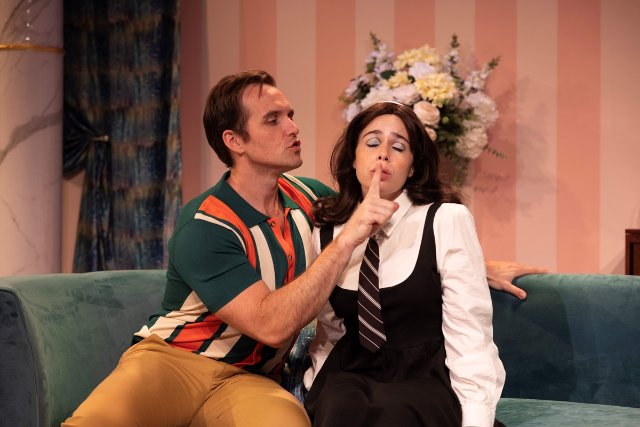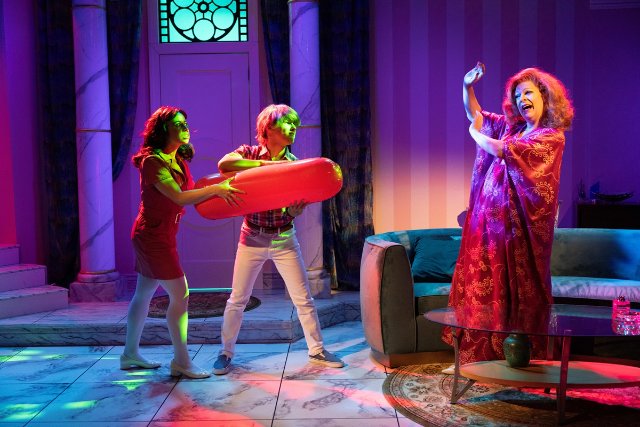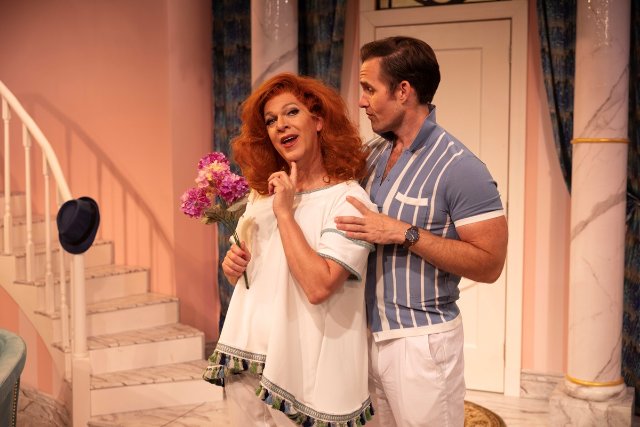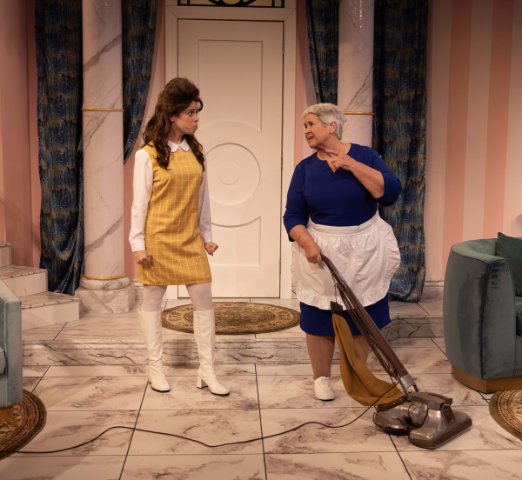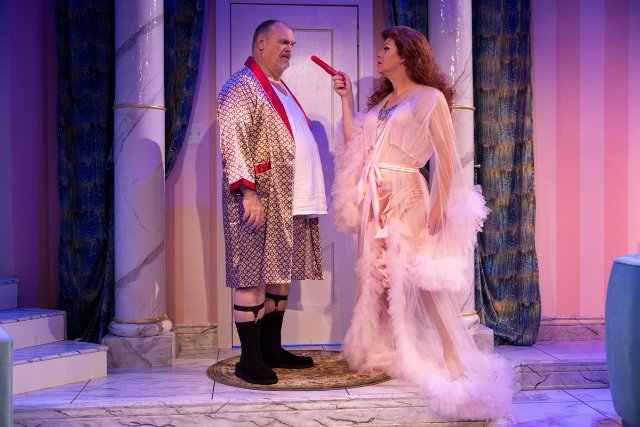Die, Mommie, Die!
A Hilarious Comedy Classic in South Florida
By: Aaron Krause - Aug 28, 2024
While summer camp is over for kids, a different kind of camp is in session for adults at Island City Stage (ICS). There, the side-splitting camp comic classic Die, Mommie, Die!, which is not for children, is keeping the laughometer as high as current temperatures in hot and humid South Florida.
In its intimate black box theater space in Wilton Manors, ICS is presenting an energetic, entertaining, and believable professional production of Charles Busch’s thrilling comedy through Sept. 22. The show, which closes out ICS’s 2023-24 season, runs about two hours, including an intermission.
ICS Artistic Director Andy Rogow directs a cast of six with sensitivity, attention to detail, and over-the-top comic energy. But Rogow and his cast also know when to exercise restraint. The result is a hilarious production that is also touching at times.
The cast comprises gifted South Florida performers Kris Andersson (he of Dixie Longate fame), Clay Cartland, Elizabeth Dimon, Susanna Ninomiya, Troy J. Stanley, and Kevin Veloz.
Meanwhile, skilled behind-the-scenes artists do their part to believably create the world of the play. It takes place in 1967 Beverly Hills. In addition to Rogow, the artists are Robert F. Wolin (scenic design), Ardean Landhuis (lighting design), W. Emil White (costume design), and David Hart (sound design).
Mostly, Die, Mommie, Die! is an escapist show. It never pretends to be a thought-provoking piece full of nuance and subtlety.
In the play, the prolific and talented Busch has fun with Greek tragedy (who knew the 5th century Greek tragedy Electra, with which Die, Mommie Die! shares similarities, could be such a laugh riot) and 1960s melodramatic films known as Grande Dame Guignol Cinema. This subgenre of horror/thriller movies generally features a formerly glamorous older woman. At same point, she became mentally unbalanced and began to terrorize those around her. The subgenre officially began in 1962 with the film, Whatever Happened to Baby Jane? Grand Dame Guignol Cinema features aging stars such as Bette Davis, Joan Crawford and Lana Turner.
Die, Mommie, Die! also celebrates live theater, with its multiple references to popular shows. Also, the characters are not necessarily who you think they are; they may be acting or masking their less than desirable qualities.
In the 1999 play Die, Mommie, Die!, which is the basis for the 2003 film of the same name, ex-pop singer Angela Arden (played in drag by male actor Andersson) finds herself trapped. She is stuck in a hateful marriage with struggling film producer Sol Sussman. In fact, she’s desperate to find happiness with her young lover, Tony Parker. So, Angela murders her chronically constipated husband with a poisoned suppository. And the children, suspicious of their mother, slip her some LSD, a psychedelic drug, to uncover the truth. After the drug takes effect, Angela spills secrets. They may forever change the characters’ lives. Expect surprises such as at least one plot twist.
In addition to physical, slapstick humor, Busch includes juicy one-liners and insults. Truly, the putdowns should satisfy fans of sitcoms such as Sanford and Son – especially the moments when Fred Sanford and Esther Anderson mercilessly go at each other. Well, this play also features such moments. And during these times, the actors raise the heat in the room as they believably imbue their characters with a fiercely competitive, intense air.
Clearly, Busch is not out to horrify us. You know he is just having fun with darkness when, for instance, a character says a line such as “Why can’t he just die?” Immediately after the character says the word “die,” dark, dramatic music suddenly plays as the wide-eyed individual quickly looks at the audience.
Neither the play, nor ICS's production of it, feature anything visually upsetting. But when it comes to language, Busch’s unapologetically vulgar words are enough to earn this show an R or X rating if it were a movie.
At one point, Angela asks her son, Lance, “Are you…are you…a cocksucker?”
And in ICS’s triumphant production, Andersson says the word “cocksucker” so sincerely and innocently that you can’t help but laugh. This is one of many strong points in ICS’s production. It features deft comic timing – characters know exactly when to, for example, raise an eyebrow, widen their eyes, or flash an exaggerated facial expression to achieve the desired comic effect. Also, try not to laugh when Angela’s nostrils widen as she smells her lover’s hand, or when her breasts and chest shake as she laughs.
But there are also touching moments. For instance, Sol affectionately touches Edith’s nose to suggest his warm feelings for her.
Obviously, Angela’s husband, Sol, adores his daughter, Edith, and vice versa. She’s a daddy’s girl and Sol’s a proud papa, at least to his daughter. The strong chemistry between Stanley, as Sol, and Ninomiya, as Edith, make us believe that their characters deeply love each other.
Just as clear love exists between certain characters, thick tension grips those who can’t stand the sight of each other. And just as Rogow places actors into positions that suggest love, the director positions those who are at odds with each other in appropriately confrontational stances.
The actors succeed as an ensemble by, for example, listening and reacting to each other’s characters. In addition, the performers create distinct, believable individuals to whom we can easily relate.
Andersson, perhaps best known for creating the off-Broadway hit show, Dixie’s Tupperware Party, plays Angela. It would have been easy for the performer to beg for laughs by overdoing broad expressions in a seemingly forced manner. Instead, Andersson lets the comedy spring naturally from the character by portraying her sincerely. Indeed, the performer portrays Angela with impressive restraint at times. And when Andersson exaggerates, the expression, like all others, seems spontaneous.
We sense Angela’s presence as soon as she enters. With long reddish hair, dark eyeliner, and reddish lipstick, Andersson’s Angela first comes on stage sporting a large green hat and a bright costume befitting a comedy. She projects a confident air and a commanding presence.
Andersson’s Angela sounds like a man. That, and seeing him dressed in women’s clothing, is enough to earn laughs.
Andersson’s Angela can be sassy one moment and tender and sincere the next. She is unpredictable and so is the play that she is in. Undoubtedly, that is one of Die, Mommie, Die's winning qualities.
Stanley is believably commanding, stern, and wisecracking as Sol. In addition, the performer convincingly conveys the character’s softer side. This is particularly true when Sol interacts with his daughter.
Stanley, like the other performers, use their eyes to convey emotions and feelings. Eyes generally widen when the characters are surprised or even shocked, and narrow when they are arguing with each other.
Cartland makes Tony a seemingly charming, fresh-faced young man. He can be jovial and sexy. It’s easy to see why somebody would fall for him. But Tony, like the others, may be donning “masks” to hide darker aspects of their characters.
As the maid, Bootsie Carp (her first name alone is enough to elicit at least a chuckle), Dimon believably makes her character well-meaning and affable. But Dimon is just as effective at credibly portraying an adamant, Bible-quoting, fiercely competitive woman.
Ninomiya nails Edith’s “daddy’s girl” persona, portraying her with a bubbly, dreamily demeanor. At times, when she’s interacting with her father, Ninomiya’s Edith comes across as a lovestruck Juliet from Shakespeare’s famous tragedy. But Ninomiya also excels at turning Edith into a conspiratorial, competitive, determined young woman -- one who is working closely with her brother to at least find out the truth.
Speaking of Edith’s gay, delicate brother, Lance, Veloz injects him with a fragile, sensitive aura. Sometimes, it seems as though he is seconds away from having an anxiety attack. The character may be emotionally disturbed, but Veloz wisely stays away from stereotypes. And Veloz’s Lance seemingly gains confidence, especially when he’s conspiring with his sister.
The actors perform on Wolin’s bright, spacious, elegant set. It depicts the Sussmans’ 1967 Beverly Hills home.
With pinkish walls, French lime-green furniture, and period details, the set has a feminine look and an opulent, inviting atmosphere. Certainly, the set’s bright colors befit a comedy. And the black designs on the white floor might suggest tension between a tragedy and comedy, darkness and light.
Landhuis illuminates the set brightly and realistically for much of the show. That style stands in stark contrast to scenes during which Angela is under the influence of LSD. During these moments, the designer uses a blending of colors to evoke an otherworldliness. These non-realistic lighting effects, combined with sound designer Hart’s dream-like sounds, suggest a dreamscape…or nightmare.
Costume designer W. Emil White clothes the actors in mostly bright colors which suit a comedy. For darker scenes, the characters appropriately wear black. The costumes seem appropriate for the period in which Busch has set his play.
Of course, you don’t have to be familiar with Greek tragedy or Grande Dame Guignol Cinema to appreciate Die, Mommie, Die! If you’re simply a person who appreciates culture, it should be easy, especially these days, to appreciate a play that celebrates the arts, such as live theater.
Indeed, during a time when censors are banning books and a certain governor is vetoing funding for the arts, a show that appreciates or celebrates culture is most welcome. Of course, a show with laughs is also always welcome, especially during these dark times.
IF YOU GO
WHAT: "Die, Mommie, Die!" by Charles Busch
WHERE: Island City Stage, 2304 North Dixie Highway, Wilton Manors
WHEN: 7 p.m., Thursday, 8 p.m., Friday and Saturday, 5 p.m. Sunday. Opens Thursday Aug. 22 through Sunday, Sept. 22.
TICKETS: $40, $45, $55 (Mimosa Sunday, Sept. 8)
INFORMATION: 954-928-9800 or islandcitystage.org

